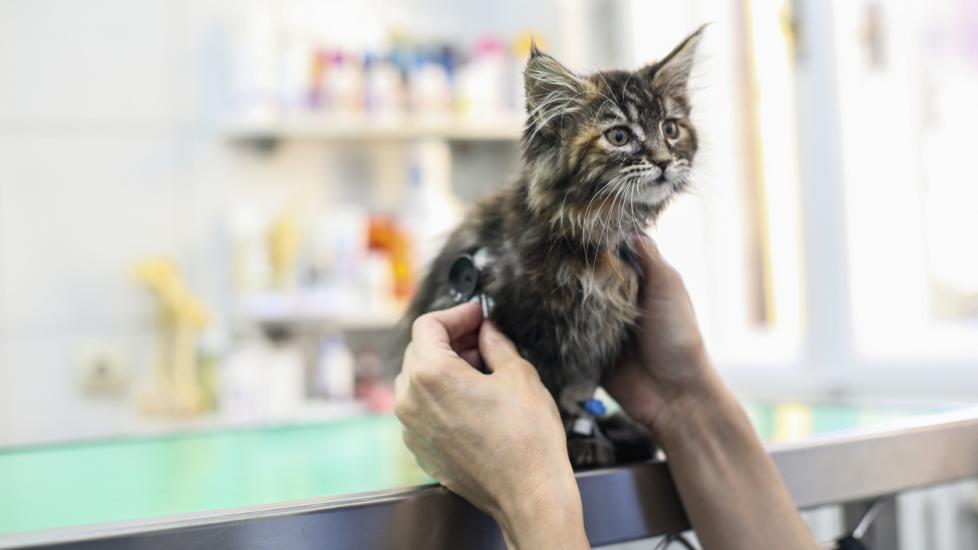Aspiration Pneumonia in Cats
What Is Aspiration Pneumonia in Cats?
The lungs function the same in cats as they do in humans; they remove used air (carbon dioxide) and supply the body with fresh oxygen in a process called ventilation. The lungs also transfer oxygen directly into the bloodstream to nourish tissues.
Pneumonia occurs when the transfer of oxygen is disrupted. Aspiration pneumonia occurs when a cat accidentally breathes in a substance that inhibits that transfer. Lack of oxygen for any reason can very quickly progress to severe illness, so if a cat shows any symptoms of aspiration pneumonia it is important to have them seen immediately by a veterinarian.
Symptoms of Aspiration Pneumonia in Cats
Symptoms can occur quickly or develop slowly. The progression of symptoms will greatly depend on the severity of the aspiration. Some of the signs and symptoms include:
-
Increased breathing rate
-
Increased heart rate
-
Lack of appetite
-
Green or yellow nasal discharge
-
Fever
-
Coughing
-
Lethargy
-
Respiratory distress
-
Open-mouth breathing
Causes of Aspiration Pneumonia in Cats
Aspiration pneumonia is most commonly caused by accidentally inhaling vomit or contents from the stomach. Stomach acid can cause inflammation in the airways and often contains bacteria, which can lead to infection in the lung tissue, which then results in pneumonia.
Other risks or causes include:
-
Throat or esophageal disorders (megaesophagus)
-
Anesthesia, which can cause vomiting
-
Muscle disorders (myasthenia gravis)
-
Seizures
-
Oral cavity defects (such as cleft palate)
How Veterinarians Diagnose Aspiration Pneumonia in Cats
A history of vomiting, one or more of the clinical signs listed above, and a physical exam may lead your veterinarian to suspect aspiration pneumonia. Your cat’s breathing may also sound harsh when your veterinarian listens to their lungs.
Tests your veterinarian may recommend include:
-
Radiographs (x-rays) of the chest are the primary tool in diagnosing aspiration pneumonia; they will give your veterinarian a picture of how the lungs are functioning. Depending on the severity of your cat’s symptoms, your veterinarian may recommend additional testing.
-
A chemistry/complete blood count is a blood test that checks red and white blood cell levels, glucose level, electrolytes, and organ function. This may be done in the hospital but may also need to be sent out to a laboratory. Results in cats with aspiration pneumonia will often show elevated levels of white blood cells and low red blood cell counts.
-
An upper respiratory panel is a specialized test in which a swab is taken of the upper airway to test for viruses and bacteria.
-
A culture may be taken from your cat’s trachea and/or nasal passage to determine what kind of bacteria is present and which antibiotics would be best to treat the infection.
Treatment of Aspiration Pneumonia in Cats
Treatment will generally consist of broad-spectrum antibiotics. Based on their symptoms your cat may need to be hospitalized.
Additional treatments may include:
-
Supportive care like intravenous (IV) fluid therapy
-
Supplemental nutrition therapy, potentially through a feeding tube
-
Nebulization to keep the airways moist, and supplemental oxygen.
-
Antifungals or other medications if other causes are suspected
Your cat’s prognosis depends on the severity of symptoms, his response to treatment, and the initial cause of the aspiration pneumonia. When medical attention is prompt, most cats recover well.
Recovery and Management of Aspiration Pneumonia in Cats
Most cats with aspiration will require at least some time in the hospital and many will require supplemental oxygen. Hospitalization may be 1-3 days or more depending on their case. Antibiotics are likely to be prescribed to your cat for a minimum of 14 days.
Most cats do not have any lingering issues once they have fully recovered from aspiration pneumonia. Certain cats with underlying issues may be susceptible to recurrence of aspiration pneumonia.
Aspiration Pneumonia in Cats FAQs
Can cats recover from aspiration pneumonia?
Yes. With prompt and adequate medical treatment, most cats diagnosed with aspiration pneumonia recover completely.
How quickly does aspiration pneumonia develop in cats?
Aspiration pneumonia caused by the breathing in of vomit/stomach contents can cause symptoms in cats 1-18 days after the event.
How do vets treat aspiration pneumonia?
The mainstay of treatment of aspiration pneumonia is antibiotics. Additional treatments like intravenous fluid therapy, nutrition supplements, oxygen therapy or nebulization may be required.
What are the signs of aspiration pneumonia?
Symptoms of aspiration pneumonia may include coughing, an increased breathing rate, breathing with the mouth open, or fever.
References
-
Levy N, Ballenger E, Koenigshof A. Clinical and radiographic findings in cats with aspiration pneumonia: retrospective evaluation of 28 cases. Journal of Small Animal Practice. 2019;60(6):356-360.
Featured Image: iStock.com/GoodLifeStudio
